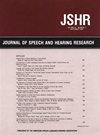Effect of Stellate Ganglion Block on Dysphagia and Cognitive Impairment in Cerebral Small Vessel Disease: A Randomized Controlled Study.
IF 2.2
2区 医学
Q1 AUDIOLOGY & SPEECH-LANGUAGE PATHOLOGY
Journal of Speech Language and Hearing Research
Pub Date : 2024-09-13
DOI:10.1044/2024_jslhr-24-00145
引用次数: 0
Abstract
BACKGROUNDS Cerebral small vessel disease (CSVD) can potentially and frequently lead to dysphagia and cognitive impairment. Stellate ganglion block (SGB) can alleviate the symptoms by regulating neural pathways and improving cerebral blood circulation. OBJECTIVES This study aimed to explore the clinical effect of SGB on airway protection, dysphagia, cognitive impairment, and activities of daily living (ADL) in CSVD patients. METHOD This was a randomized controlled study conducted from February 2021 to May 2023, including 84 CSVD patients with dysphagia and cognitive impairment. The participants were randomly divided into the SGB group (n = 42) and the untreated group (n = 42). All received standard-of-care rehabilitation for 20 days. The SGB group received SGB once a day additionally. Assessments were conducted on Day 1 and Day 20, respectively. The Penetration-Aspiration Scale (PAS) was primary outcome. Modified Barium Swallow Impairment (MBSImp), Mini-Mental State Examination (MMSE), Modified Barthel Index (MBI) and adverse events were secondary outcomes. This study was registered at ClinicalTrials.gov, Identifier: NCT06176404. RESULTS There were two dropout cases in the untreated group. Time effect with statistical significance was observed in all assessments (p < .05). Group effect with statistical significance was observed in the PAS (z = -17.283, p < .001), MBSImp-Oral (z = -3.382, p = .001), MBSImp-Pharyngeal (z = -2.639, p = .008), MMSE (F = 7.450, p = .008), and MBI (F = 6.408, p = .013). During the treatment, there were no severe adverse events. CONCLUSION SGB can significantly and safely improve airway protection, dysphagia, cognitive function, and ADL in CSVD patients with dysphagia and cognitive impairment who received standard-of-care rehabilitation.星状神经节阻滞对脑小血管疾病患者吞咽困难和认知障碍的影响:随机对照研究》。
背景脑小血管病(CSVD)可能并经常导致吞咽困难和认知障碍。星状神经节阻滞(SGB)可通过调节神经通路和改善脑血液循环来缓解症状。目的本研究旨在探讨SGB对CSVD患者气道保护、吞咽困难、认知障碍和日常生活活动(ADL)的临床影响。方法这是一项随机对照研究,研究时间为2021年2月至2023年5月,共纳入84名伴有吞咽困难和认知障碍的CSVD患者。参与者被随机分为SGB组(42人)和未治疗组(42人)。所有患者都接受了为期 20 天的标准康复治疗。SGB组每天额外接受一次SGB治疗。分别在第 1 天和第 20 天进行评估。吞咽-吐气量表(PAS)是主要结果。改良钡吞咽功能障碍(MBSImp)、迷你精神状态检查(MMSE)、改良巴特尔指数(MBI)和不良事件为次要结果。本研究已在 ClinicalTrials.gov 注册,标识符为结果未治疗组有两例辍学。在所有评估中均观察到具有统计学意义的时间效应(P < .05)。在PAS(z = -17.283,p < .001)、MBSImp-Oral(z = -3.382,p = .001)、MBSImp-Pharyngeal(z = -2.639,p = .008)、MMSE(F = 7.450,p = .008)和MBI(F = 6.408,p = .013)中观察到具有统计学意义的组间效应。结论 GB 可以显著安全地改善接受标准康复治疗的吞咽困难和认知障碍 CSVD 患者的气道保护、吞咽困难、认知功能和日常活动能力。
本文章由计算机程序翻译,如有差异,请以英文原文为准。
求助全文
约1分钟内获得全文
求助全文
来源期刊

Journal of Speech Language and Hearing Research
AUDIOLOGY & SPEECH-LANGUAGE PATHOLOGY-REHABILITATION
CiteScore
4.10
自引率
19.20%
发文量
538
审稿时长
4-8 weeks
期刊介绍:
Mission: JSLHR publishes peer-reviewed research and other scholarly articles on the normal and disordered processes in speech, language, hearing, and related areas such as cognition, oral-motor function, and swallowing. The journal is an international outlet for both basic research on communication processes and clinical research pertaining to screening, diagnosis, and management of communication disorders as well as the etiologies and characteristics of these disorders. JSLHR seeks to advance evidence-based practice by disseminating the results of new studies as well as providing a forum for critical reviews and meta-analyses of previously published work.
Scope: The broad field of communication sciences and disorders, including speech production and perception; anatomy and physiology of speech and voice; genetics, biomechanics, and other basic sciences pertaining to human communication; mastication and swallowing; speech disorders; voice disorders; development of speech, language, or hearing in children; normal language processes; language disorders; disorders of hearing and balance; psychoacoustics; and anatomy and physiology of hearing.
 求助内容:
求助内容: 应助结果提醒方式:
应助结果提醒方式:


